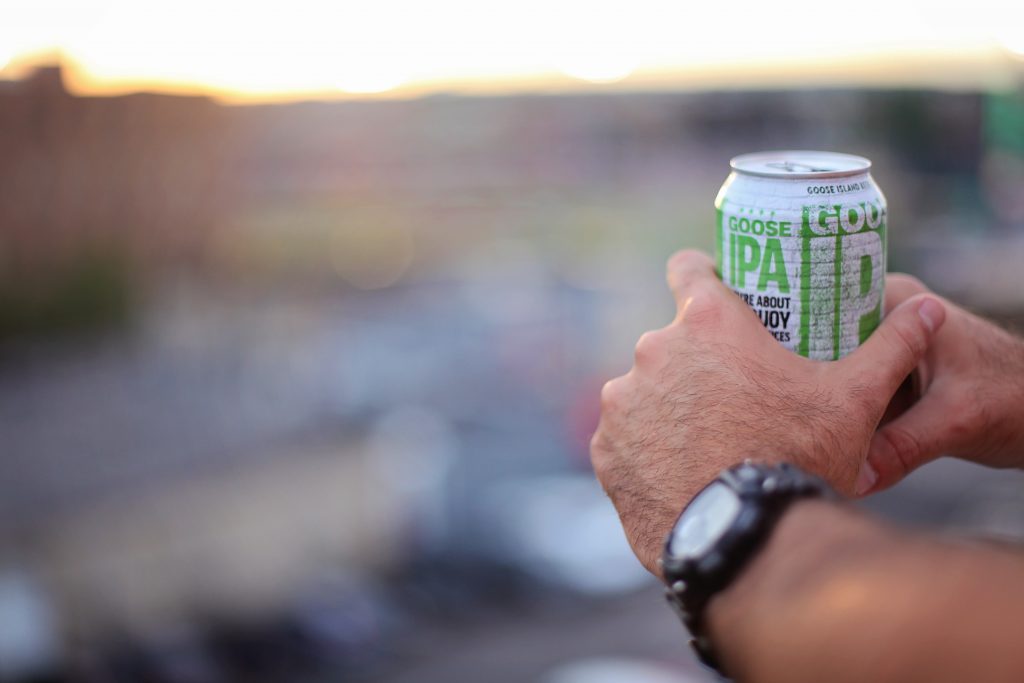In 2011, Anheuser-Busch InBev bought the Chicago craft brewery Goose Island. Today, the international conglomerate owns stake in a dozen formerly-craft American breweries. (Leah Kelley photo)
I used to bartend at one of the oldest dive bars in Western Mass, pouring drinks for the proudly unhip. Such neighborhood joints watch the decades pass with a warm and studied slowness. Behind these doors, familiar routines trump most things strange and new.
I was there in the spring of 2016, when the presidential campaign ruled the airwaves. Many of my customers argued politics, but I typically stayed out of it. Only once did I sway someone’s thinking.
Let’s call him Carl. He was trying, with little success, to convince a friend we’ll call Jim that electing Trump would put more wages and spending dollars in the pockets of average Americans. Jim, unfazed, sipped his Yuengling.
It was a bar of Budweiser drinkers, and ribbing Jim for his preferred beer had become a favorite pastime. Carl fell back on that now, asking Jim why he was always drinking “that new stuff.”
I mentioned to Carl that the Yuengling company is almost two hundred years old — it’s the oldest operating brewery in the United States. Jim smiled, but Carl rolled his eyes and flicked his finger at his empty beer glass.
So I added, in my kindest barkeep voice, that Jim’s beer dollars remain here in the United States, whereas every time we empty a keg of Bud Light, it quenches the thirst of InBev, the Brazilian-Belgian beverage conglomerate that acquired Anheuser-Busch in 2008.
Carl paused, so I gave him a taste of Yuengling. He shrugged, then took a full pour.
 Later, I discovered that Yuengling owner Richard Yuengling, Jr. is a Trump supporter (I didn’t have the heart to tell Jim). Still, you get the idea. Wealth shapes policy, here and abroad — but your own money talks, too. Even when it comes to beer.
Later, I discovered that Yuengling owner Richard Yuengling, Jr. is a Trump supporter (I didn’t have the heart to tell Jim). Still, you get the idea. Wealth shapes policy, here and abroad — but your own money talks, too. Even when it comes to beer.
The not-for-profit Brewers Association considers Yuengling a craft beer, since the company is majority independently-owned, and brews only half of the six million annual barrels considered the maximum by the Association. But Yuengling only looks small alongside really huge companies. To find real craft, zoom in on your local beer scene. The smaller and more local a brewery remains, the more immediately its profits support the economy on which your friends and neighbors rely.
In 2017, 39 breweries opened in Massachusetts, bringing the total to 154, and at least 25 more are expected to open this year. Nationally, there are now more than 6,000 breweries — 98 percent of which are small and independent — and beer tourism is on the rise (83 percent of Americans now live within 10 miles of a local brewery).
American craft brewers are currently responsible for more than 456,000 jobs, some 128,000 of which are at brewpubs and breweries. In 2016, craft brewers injected $67.8 billion into the U.S. economy, including $73.4 million donated to charitable causes.
These numbers are from Mass Brew Bros, the Brewers Association’s 2016 Economic Impact Report, and the Association’s 2017 Craft Beer in Review. These are your beer dollars at work.
Now here’s the bad news: Big Beer has noticed, and its wants a big cut of the growth. Brewers Association president Bob Pease told NPR last summer that around 2011, “AB InBev hit on this strategy of just buying the breweries that had the kind of mojo or street cred that they weren’t nimble enough to replicate in their own breweries.”
And corporate acquisitions of craft breweries are on the rise. Anheuser-Busch InBev now owns regional favorites like Ten Barrel Brewing, Blue Point Brewing, Karbach, Breckenridge, Devil’s Backbone, Shock Top, Goose Island, Golden Road, Elysian, Four Peaks, and portions of Kona Brewing and Red Hook. Mahou-San Miguel owns 30 percent of Founders Brewing. MillerCoors owns Revolver, Saint Archer, Hop Valley, Leinenkugel’s, and Blue Moon.
Heineken now owns Lagunitas. Constellation Brands, which makes Corona — and which recently made a deal with the Mexican government that threatens to drain the local drinking water supply for residents of Baja — now owns Ballast Point.
Last May, Wicked Weed Brewing in North Carolina caused a particularly sharp uproar in the craft beer world by announcing it was being purchased by Anheuser-Busch InBev. Wicked Weed co-founder Walt Dickinson assured the public that his staff largely remains in place, and that the quality of the beer won’t suffer. But that didn’t appease many fans and collaborators.
Wicked Weed lost its voting rights in a craft beer guild, saw scores of breweries drop out of its annual Funkatorium beer competition, and was ousted from numerous bars and restaurants. Several craft breweries halted special projects and collaborations with Wicked Weed, including Black Project brewery in Denver, which denounced InBev’s “business strategies, mission, and overall ethics.”
In a blog post, Black Project explained that “In Denver alone, we’ve seen several instances of highly aggressive, predatory, and what we consider to be unethical practices … We truly believe that AB InBev intends to systematically destroy American craft beer as we know it.”
Dogfish Head founder Sam Calagione has claimed that craft products, once bought up by Big Beer, often reappear on taps and in stores priced at “half as much as a true indie craft beer. It really shows they’re using these once-craft brands as pawns in their game to knock the true indie breweries off the board.”
That may sound melodramatic, but Fortune reports that “of all the Big Beer makers inking deals in the space, AB InBev has been the most aggressive.” AB InBev recently purchased a stake in the beer rating website RateBeer, raising concerns about conflict of interest. And over the last couple of years, antitrust regulators and the U.S. Justice Department have been probing allegations that AB InBev intends to curb competition by buying up beer distributors and preventing them from selling competing brands.
“We have seen a dramatic consolidation in our industry in recent years,” wrote Boston Beer founder Jim Koch in a New York Times op-ed last April. This began in 2008, when the Department of Justice allowed Molson Coors and SABMiller to join forces.
“Overnight, about 90 percent of domestic beer production was in the hands of two brewing giants,” wrote Koch, whose company makes Sam Adams beer and Angry Orchard hard cider. “The immediate result was a 6 percent increase in beer prices … at least 5,000 Americans lost their jobs, and cost cutting followed, saving the new owners an estimated $2 billion. That money goes to those two conglomerates that have been able to reduce their tax bills and move much of their profits offshore.”
The merger of Anheuser Busch and InBev followed that same year. And 2016 brought even more consolidation, as regulators approved the merger of SABMiller and AB InBev.
And the new Republican tax bill won’t help small craft brewers much: although they will theoretically benefit from cuts to alcohol excise taxes, the Brookings Institution points out that “for every $20 of alcohol tax cuts in the legislation, only about $1 actually goes to the true craft brewers or small distillers … [the other $19] goes to larger producers and to importers.”
That’s an ironic twist from this administration, whose rhetoric proclaims support for American businesses before all others.
More than ever, monopolies hold us back: fewer airlines to choose from, consolidation within for-profit health care, and giant food company mergers all tend to leave us with high prices and lower-quality goods and services. Independently-owned craft breweries, then, are not just economic engines — they exemplify a more healthy outlook on small-scale, regional business and competition.
Why am I not scared of a craft beer bubble? For the same reasons I’m not scared of a bubble in locally-grown produce, or a bubble in live music. Americans are simply rethinking where their money goes. They are producing locally, and shopping locally.
To me, this no longer feels a luxury. It has become imperative: our only means of skirting this vortex of mega-mergers, in beer and beyond.
This approach may seem idealistic. But it may also be working. Between 2007 and 2017, most of the largest American beer lines — including Bud, Coors, Miller, and Michelob — have seen sales and market share decline, according to Beer Marketer’s Insights and the Washington Post.
Every scene has its snobs, and craft beer, of course, is no exception. But the social and economic reasons to opt for a glass of “that new stuff” seem more important to me than ever. Local craft beer is a homegrown product, produced by laborers who may well live on your street.
Next time you raise a glass among friends, consider raising this issue as well. It’s political, and thank goodness — you can still put your money where your mouth is.
The Beerhunter appears monthly. Contact Hunter Styles at hstyles@valleyadvocate.com.



